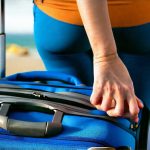The experience is frustratingly common: you’re comfortably cruising down the highway, lost in thought or enjoying a podcast, when suddenly – an urgent need to urinate arises. It’s not just about inconvenience; it can be genuinely disruptive and anxiety-inducing, especially during long journeys. This sudden onset often begs the question: why now? Why does the urge seem to strike specifically when we’re driving or traveling, rather than when comfortably at home? The answer isn’t simple, involving a complex interplay of physiological factors, behavioral patterns, and even psychological influences that become more pronounced when our routines are altered. Understanding these triggers can help us proactively manage this common issue and make travel experiences more pleasant.
This phenomenon extends beyond just urination; the urge to defecate or even experience nausea can also appear unexpectedly during journeys. It’s not necessarily a sign of an underlying medical condition, though persistent issues should always be investigated by a healthcare professional. Often, it’s related to changes in posture, decreased physical activity, and the stresses associated with travel itself – all contributing to how our bodies perceive and react to internal signals. This article will explore the multifaceted reasons behind this sudden urge while driving or traveling, providing insight into both the physiological mechanisms at play and practical strategies for mitigation.
Physiological Factors & The Body’s Response
The human body is remarkably sensitive to changes in its environment. When we transition from a relatively stable state – like sitting comfortably at home – to a dynamic one like driving, several internal systems are affected. One of the most significant is our postural control and how gravity impacts bladder and bowel function. While seemingly subtle, even slight shifts in body position can put pressure on these organs, increasing awareness of fullness and triggering the urge to go. This is particularly true after prolonged sitting – a common scenario during travel. The sensation isn’t necessarily about having a full bladder or bowel; it’s more about increased sensitivity due to compression.
Furthermore, our kidneys are constantly filtering waste products from the blood. The rate of filtration can be influenced by hydration levels and even stress. When we are adequately hydrated, the kidneys produce urine at a consistent pace. However, if we consume excessive fluids before or during travel – or if we’re already well-hydrated – the bladder fills faster, increasing the likelihood of needing to urinate. Similarly, stress hormones released during driving (even unconsciously, due to traffic or time pressure) can impact kidney function and bladder control. This is because stress often leads to increased blood flow towards essential organs, potentially including the kidneys, which increases urine production.
Finally, decreased physical activity plays a role. Movement helps stimulate peristalsis – the muscular contractions that move waste through our digestive system. When we’re sedentary for extended periods, like during a long drive, this process slows down, leading to potential discomfort and an increased sensation of needing to eliminate. It’s important to remember that these aren’t isolated factors; they often work in concert to amplify the urge while traveling.
The Role of the Autonomic Nervous System
The autonomic nervous system (ANS) governs many bodily functions we don’t consciously control, including bladder and bowel function. This system has two primary branches: the sympathetic nervous system (“fight or flight”) and the parasympathetic nervous system (“rest and digest”). Driving involves a degree of mental alertness and focused attention, which subtly activates the sympathetic nervous system. While this is necessary for safe driving, it can also increase anxiety and sensitivity to internal sensations.
- Increased sympathetic activity can lead to:
- Heightened awareness of bodily functions.
- Changes in bladder capacity perception.
- Minor muscle tension around the pelvic floor, potentially exacerbating the urge.
The parasympathetic nervous system, responsible for relaxation and digestion, typically dominates when we’re resting. However, travel often disrupts this balance. Changes in routine, unfamiliar environments, and even slight discomfort can hinder the parasympathetic response, making us more susceptible to sympathetic dominance and heightened awareness of bodily needs.
Hydration & Dietary Influences
Staying adequately hydrated is essential for overall health, but timing is key when traveling. Drinking large quantities of fluid immediately before or during a journey significantly increases urine production and the likelihood of needing to stop. It’s generally advisable to hydrate well before travel and sip small amounts of water throughout the journey, rather than gulping down large volumes at once. The same principle applies to certain beverages – caffeine and alcohol are diuretics, meaning they increase urine production.
- Foods can also play a role:
- Spicy foods can irritate the bladder in some individuals.
- High-fiber diets, while generally healthy, can lead to increased bowel movements, especially if you’re not used to them.
- Certain fruits and vegetables (like watermelon or citrus fruits) have natural diuretic properties.
Being mindful of your intake before and during travel – tailoring it to your individual sensitivities – can help minimize unwanted urges.
Psychological Factors & The Power of Expectation
Beyond the purely physiological, psychological factors often contribute significantly to the experience. Anticipatory anxiety, for example, can heighten our awareness of bodily sensations. If you’ve had a previous negative experience needing to stop frequently during a journey, you might unconsciously anticipate this happening again, leading to increased vigilance and a heightened perception of urgency. This is especially true if you have a history of overactive bladder or bowel issues.
Furthermore, the mental focus required for driving can sometimes amplify internal sensations. When our attention is directed outwards – on the road ahead – we’re less likely to notice subtle bodily signals. However, during lulls in traffic or moments of quiet contemplation, these signals become more prominent. This doesn’t necessarily mean there’s a problem; it simply means you’re paying closer attention to your body. The key is to avoid catastrophizing the urge – recognizing that it might be a temporary sensation and not necessarily requiring immediate action.
It’s vital to reiterate that this information is for general knowledge and informational purposes only, and does not constitute medical advice. If you experience persistent or concerning symptoms related to urinary or bowel function, please consult with a qualified healthcare professional.





















